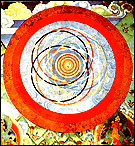Connections Through Time, Issue 12: July - September 2001


Intuition is intimately connected to the human mind. Mind can be defined as (from www.dictionary.com):
mind \Mind\,
n.
 Consciousness and "unconscious processes" are part of
what you are - these are your mind. Add your body, and that's you!
At
any moment, the mind is conscious of certain thoughts, memories,
imaginations, perceptions, sounds,
sights, smells, tastes, and/or emotions. Whatever else is in the mind at
that moment is in the "unconscious processes" which are generally
referred to as the unconscious or subconscious mind. For example, memories are
in the subconscious mind and can be "shared" with the conscious mind
and physical body...memories of past events become thoughts and emotions, or
memories of learned activities, such as bicycle riding, become automatic
physical behaviors.
Intuitive perceptions also come from the subconscious mind and can be shared
with, or communicated to, the conscious mind.
Consciousness and "unconscious processes" are part of
what you are - these are your mind. Add your body, and that's you!
At
any moment, the mind is conscious of certain thoughts, memories,
imaginations, perceptions, sounds,
sights, smells, tastes, and/or emotions. Whatever else is in the mind at
that moment is in the "unconscious processes" which are generally
referred to as the unconscious or subconscious mind. For example, memories are
in the subconscious mind and can be "shared" with the conscious mind
and physical body...memories of past events become thoughts and emotions, or
memories of learned activities, such as bicycle riding, become automatic
physical behaviors.
Intuitive perceptions also come from the subconscious mind and can be shared
with, or communicated to, the conscious mind.
Developing reliable communication of intuitive information between the conscious and subconscious portions of the mind is the grand challenge for anyone interested in exploring their own mind and intuitive capabilities. How the subconscious and conscious minds communicate intuitive information is a wonderful mystery. The practical issue is how to improve these communication skills - the issue is how to apply intuition in practical ways that will improve our lives and the lives of others. For practical clues, we look to how memory works. The nervous system is the physical intermediary for memory. For retrieving memories, we can imagine that the information is somehow stored in our physical brain and that our subconscious mind is able to retrieve these memories and communicate them to our conscious mind and physical body.
 For intuitive information, we can envision a similar situation,
except the information storage is much more complex, to say the least. For
example, consider precognition - where and when is information about the future
stored? We don't know, so let's simply assume that all information is
stored in a "mysterious place". We can now imagine, in a fashion
similar to memory, that our subconscious mind is able to retrieve information
from this mysterious place and communicate it to our conscious mind and our
physical body using our nervous system.
For intuitive information, we can envision a similar situation,
except the information storage is much more complex, to say the least. For
example, consider precognition - where and when is information about the future
stored? We don't know, so let's simply assume that all information is
stored in a "mysterious place". We can now imagine, in a fashion
similar to memory, that our subconscious mind is able to retrieve information
from this mysterious place and communicate it to our conscious mind and our
physical body using our nervous system.
Can communication with the subconscious mind be improved?
The answer is clearly yes in many time-honored areas, such as sports. Mind
and body training have now become standard in schooling athletes of all
kinds. For example, see Training
the Olympic Athlete. And remember the book, "The
Inner Game of Tennis". Here's an editorial review to remind you that approaches
for improving inner communication with your subconscious have been around for a long time...even longer than 1972.
A phenomenon when first published in 1972, the Inner Game
was a real revelation. Instead of serving up technique, it concentrated on the
fact that, as Gallwey wrote, "Every game is composed of two parts, an outer
game and an inner game." The former is played against opponents, and is
filled with lots of contradictory advice; the latter is played not against, but
within the mind of the player, and its principal obstacles are self-doubt and
anxiety. Gallwey's revolutionary thinking, built on a foundation of Zen thinking
and humanistic psychology, was really a primer on how to get out of your own way
to let your best game emerge. It was sports psychology before the two words were
pressed against each other and codified into an accepted discipline.
How far can training take you for improving your ability to obtain intuitive information - we don't know. Just as athletes vary in their skill levels for a variety of reasons including variations in genetics, perseverance, and training, we expect the same sort of variations in the intuitive skills. In the next section, we discuss a new simple online approach that will permit you to explore and expand your skills in communicating with your subconscious mind.
For intuitive information, the saying "It is all in your mind" is pretty close to the truth. One issue is how to train your conscious mind and body to listen to your subconscious mind. The second issue is to align your conscious and subconscious minds toward the same goals so that what you hear is relevant and important to your life.
![]() To assist you in exploring the mysteries of your own intuition,
an online approach has been developed and is discussed in the
next section. Have fun as you explore your inner self.
To assist you in exploring the mysteries of your own intuition,
an online approach has been developed and is discussed in the
next section. Have fun as you explore your inner self.
References
Go to another section of this
issue:
Physics: Working Memory
Applications: An Online Protocol for Exploring
Your Intuition![]()